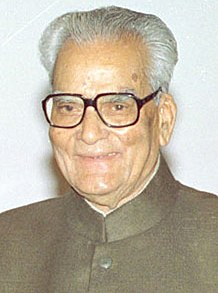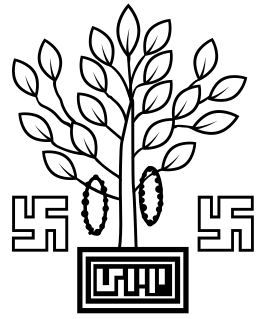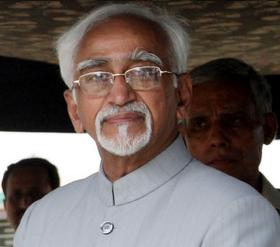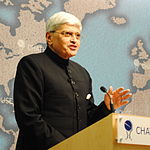The politics of India works within the framework of the country's constitution. India is a federal parliamentary democratic republic in which the President of India is the head of state and the Prime Minister of India is the head of government. India follows the dual polity system, i.e. a double government that consists of the central authority at the centre and states at the periphery. The constitution defines the organisational powers and limitations of both central and state governments, and it is well recognised, rigid and considered supreme; i.e. the laws of the nation must confirm to it.

Lal Krishna Advani is an Indian politician who served as the 7th Deputy Prime Minister of India from 2002 to 2004 under Atal Bihari Vajpayee. He is one of the co-founders and a senior leader of the Bharatiya Janata Party. Advani also served as Minister of Home Affairs in the BJP-led National Democratic Alliance government from 1998 to 2004. He was the Leader of the Opposition in the 10th Lok Sabha and 14th Lok Sabha. He was the National Democratic Alliance prime ministerial candidate in the 2009 general elections.
The National Democratic Alliance (NDA) is a coalition of right wing to far right political parties in India, and over the time has had some centre to left parties in it as well. At the time of its formation in 1998, it was led by the BJP and had 13 constituent parties.

Janata Dal (United) is a centre-left Indian political party with political presence mainly in eastern and north-eastern India. JD(U) is recognised as a state party in the states of Bihar and Arunachal Pradesh and is a part of government in Bihar and Nagaland. JD(U) heads the government in Bihar and is the second largest party in Arunanchal Pradesh. JD(U) won 16 seats in the 2019 Indian general election, making it the seventh largest party in the Lok Sabha. The party operates on the ideologies of socialism, secularism and integral humanism.

Muppavarapu Venkaiah Naidu is an Indian politician and the current Vice President of India and the Chairman of the Rajya Sabha, in office since 11 August 2017. Previously, he served as the Minister of Housing and Urban Poverty Alleviation, Urban Development and Information and Broadcasting in the Modi Cabinet. A prominent leader of the Bharatiya Janata Party, he also served as its national president from 2002 to 2004. Earlier, he was the Union Cabinet Minister for Rural Development in the Atal Bihari Vajpayee government. He took the oath as Vice-President of India and the Chairman of Rajya Sabha on 11 August 2017.He served as President of the Indian Institute of Public Administration, Chancellor of Panjab University, Delhi University, Pondicherry University and the President of the Indian Council of World Affairs in his capacity as Vice President.

The Vice President of India is the second-highest constitutional office in India after the President. Article 63 of Indian Constitution states that "There shall be a Vice President of India." The Vice President acts as President in the absence of the president due to death, resignation, impeachment, or other situations.

Bhairon Singh Shekhawat was the 11th Vice President of India. He was also a M.L.A. from Shrimadhopur.He served in that position from August 2002, when he was elected to a five-year term by the electoral college following the death of Krishan Kant, until he resigned on 21 July 2007, after losing the presidential election to Pratibha Patil. Shekhawat was a member of the Bharatiya Janata Party (BJP), a leading member of the National Democratic Alliance at the time of election. He served as the Chief Minister of Rajasthan three times, from 1977 to 1980, 1990 to 1992 and 1993 to 1998.

Gopalkrishna Devdas Gandhi is an Indian politician and a former diplomat who served as the 23rd Governor of West Bengal serving from 2004 to 2009. He is the grandson of Mahatma Gandhi. As a former IAS officer he served as Secretary to the President of India and as High Commissioner to South Africa and Sri Lanka, among other administrative and diplomatic posts. He was the United Progressive Alliance nominee for Vice President of India 2017 elections and lost with 244 votes against NDA candidate Venkaiah Naidu, who got 516 votes.

Najma Akbar Ali Heptulla is an Indian politician and Governor of Manipur and the Chancellor of Jamia Millia Islamia, and former vice-president of the Bharatiya Janata Party (BJP), and a six time member of the Rajya Sabha, the upper house of the Indian parliament, between 1980 and 2016, and Deputy Chairman of the Rajya Sabha for sixteen years. She was a member representing Rajasthan from July 2004 to July 2010. She was nominated by the BJP for the Rajya Sabha in 2012 from Madhya Pradesh, and assumed her office on 24 April 2012.

Meira Kumar is an Indian politician and former diplomat. A member of the Indian National Congress, she was the Minister of Social Justice and Empowerment from 2004 to 2009, the Minister of Water Resources for a brief period in 2009, and the 15th Speaker of Lok Sabha from 2009 to 2014. Kumar became just the second woman to be nominated for president of India by a major political bloc when she secured the United Progressive Alliance's nomination in 2017.
Rasheed Masood is an Indian politician, a member of the Indian National Congress party and a former member of the Lok Sabha representing Saharanpur constituency in Uttar Pradesh. He was a member of the Rajya Sabha. He was also the United National Progressive Alliance candidate for the Vice-President in the 10 August 2007 election and placed third with 75 votes.

The 14th indirect presidential election, in order to elect the 13th president, was held in India on 19 July 2012. The last date for filing nominations was 30 June, whereas the votes would be counted on 22 July. The two leading candidates for the presidency were former Finance Minister Pranab Mukherjee from West Bengal and former Speaker of the Lok Sabha Purno Agitok Sangma from Meghalaya.

Elections in the state of Bihar, India are conducted in accordance with the Constitution of India. The Assembly of Bihar creates laws regarding the conduct of local body elections unilaterally while any changes by the state legislature to the conduct of state level elections need to be approved by the Parliament of India.

The 2012 Indian Vice-Presidential election was held on 7 August 2012 to elect Vice-President of India. Mohammad Hamid Ansari was the incumbent and the UPA candidate. The other prime candidate was the NDA's Jaswant Singh.
Sudhanshu Trivedi is an Indian politician. A leader of Bharatiya Janata Party and Member of Parliament from Upper House Rajya Sabha, Dr. Trivedi is serving as the National Spokesperson of Bharatiya Janata Party. Having done PhD in Mechanical Engineering he served as a faculty in Mechanical Engineering department in a couple of Indian Universities including Mahatma Gandhi Chitrakoot Gramoday Vishwavidyalaya. He also worked as Information Advisor to the former UP Chief Minister and also Political Advisor to former BJP National President Rajnath Singh. He is an ardent speaker on the issues of India's National policy, Polity, Society and particularly the Ideological aspects of Bharatiya Janata Party.

A presidential election was held in India on 17 July 2017 with the votes counted and the results announced on 20 July 2017. Ram Nath Kovind became 14th President of India. President Pranab Mukherjee, whose term of office was due to expire on 24 July 2017, declined to seek re-election due to health concerns and old age.
2017 in India highlights the national/Daily level events during the year.
















